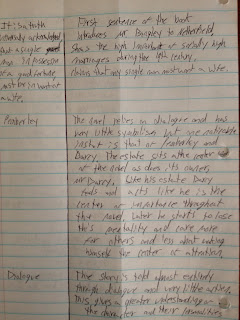1. Hell. The play begins with the three main characters being introduced to their new home, the burning center of the Earth that we dream of as a place of torture and agony. The representation of Hell in this play is different in that it is not on fire or boiling hot, freezing cold or full of torturers. It is much simpler, much more personal in design. In this play Hell is other people, others that remind us of our selves, others that we cannot escape, others that we must look at every minute for eternity with no break or rest. They remind us of our mistakes that would have put us there in the first place. The three characters speak to one another and begin to quarrel, despite different efforts made to prevent the torturing of each other the three fight. They turn their new home into what will torture them the most. They can never leave, they are stuck together forever, forever they must hate each other, and forever they must be the cause of each other's torment.
2. "Hell is other people" this is the most common theme that can be derived from the play. Others torture us when they remind us of our own faults or impurities.
3. The tone is harsh, it is dark and depletes ones spirits. It is very powerful and conveys the message to the readers forcefully and accurately . The tone shows the true torment and pain the characters go through as they truly understand why they are in Hell. They learn their faults and are tortured by the fact that it is too late to fix them, it is too late to be good again. For the prisoners in this play, there is no going back to the way things were, there is no way to redeem themselves.
4.
Setting- The setting of the story secures the fact that the other tries to imply that Hell is other people. The setting is fairly peaceful and pleasant. The room they are locked in is in no means harmful to any of its prisoners. The setting helps to emphasize that we are the cause of others pain.
Direct Characterization- Garcin tries to tell the type of person he believes himself to be. This information is mostly false but as you read you can understand why he feels this way and you can get a sense that he truly believes what he is saying.
Indirect Characterization- The majority of the characters traits are shown through actions or their words. The author does not simple state what a characters intentions or thoughts are. The author makes the reader come to their own understandings and interpretations of the characters through their interactions with the other characters and the environment that they are trapped in.
Conflict- conflict is created through the acts of characters, whether it is them interacting with each other or it is them being left alone to reflect on their own thoughts conflict is always produced by the people. The conflict in this play is created by the characters just by existing and knowing that the others exist, they cause conflict just by the existence of each other. They also cause conflict in themselves by questioning why they are where they are and what they did to deserve it.
Allegory- It is a room that can be understood to represent hell on the most basic level. The deeper you interpret the room and the characters you understand that the room is merely a place that holds the aspects, the room itself is average, a place you could see in actual life. The people and the memories that follow and haunt you into the room are what make it Hell. The room itself is not at fault but the things that we bring with us or the things that make us remember, make the room into what it is understood to represent.

.JPG)
.JPG)
.JPG)

.JPG)
.JPG)
.JPG)
.JPG)

.JPG)
.JPG)
.JPG)



